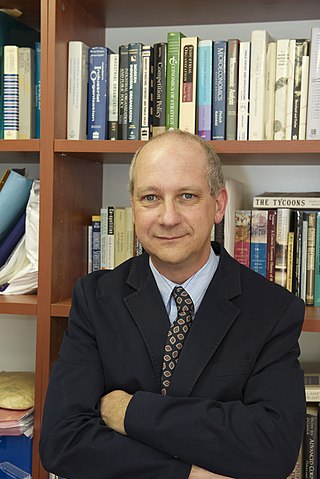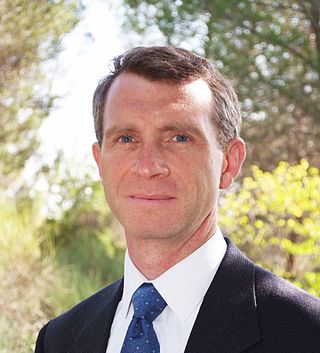
The Nasdaq Stock Market is an American stock exchange based in New York City. It is the most active stock trading venue in the U.S. by volume, and ranked second on the list of stock exchanges by market capitalization of shares traded, behind the New York Stock Exchange. The exchange platform is owned by Nasdaq, Inc., which also owns the Nasdaq Nordic stock market network and several U.S.-based stock and options exchanges. Although it trades stock of healthcare, financial, media, entertainment, retail, hospitality, and food businesses, it focuses more on technology stocks. The exchange is made up of both American and foreign firms, with China and Israel being the largest foreign sources.

Myron Samuel Scholes is a Canadian–American financial economist. Scholes is the Frank E. Buck Professor of Finance, Emeritus, at the Stanford Graduate School of Business, Nobel Laureate in Economic Sciences, and co-originator of the Black–Scholes options pricing model. Scholes is currently the Chief Investment Strategist at Janus Henderson. Previously he served as the chairman of Platinum Grove Asset Management and on the Dimensional Fund Advisors board of directors, American Century Mutual Fund board of directors, chairman of the Board of Economic Advisers of Stamos Capital Partners, and the Cutwater Advisory Board. He was a principal and limited partner at Long-Term Capital Management (LTCM), a highly leveraged hedge fund that collapsed in 1998, and a managing director at Salomon Brothers. Other positions Scholes held include the Edward Eagle Brown Professor of Finance at the University of Chicago, senior research fellow at the Hoover Institution, director of the Center for Research in Security Prices, and professor of finance at MIT's Sloan School of Management. Scholes earned his PhD at the University of Chicago.

The efficient-market hypothesis (EMH) is a hypothesis in financial economics that states that asset prices reflect all available information. A direct implication is that it is impossible to "beat the market" consistently on a risk-adjusted basis since market prices should only react to new information.

The Tel Aviv Stock Exchange, colloquially known as The Bursa, is the only public stock exchange in Israel and a public company itself, listed on its own exchange since August 1, 2019. It is regulated by the Securities Law (1968) and is under the direct supervision of the Israel Securities Authority (ISA).
A market anomaly in a financial market is predictability that seems to be inconsistent with theories of asset prices. Standard theories include the capital asset pricing model and the Fama-French Three Factor Model, but a lack of agreement among academics about the proper theory leads many to refer to anomalies without a reference to a benchmark theory. Indeed, many academics simply refer to anomalies as "return predictors", avoiding the problem of defining a benchmark theory.
Michael Cole Jensen was an American economist who worked in the field of financial economics. From 1967-1988, he was on the University of Rochester's faculty. Between 2000 and 2009 he worked for the Monitor Company Group, a strategy-consulting firm which became "Monitor Deloitte" in 2013. Until 2000, he held the position of Jesse Isidor Straus Professor of Business Administration at Harvard University.
Zvi Bodie is an American economist, author and professor. He was the Norman and Adele Barron Professor of Management at Boston University, teaching finance at Questrom for 43 years before retiring in 2015. His textbook, Investments, (with Kane and Marcus) is the market leader and is used in the certification programs of the CFA Institute and the Society of Actuaries. Bodie's work has centered on pension finance and investment strategy. He continues to do consulting work and media interviews.

In finance, an electronic trading platform also known as an online trading platform, is a computer software program that can be used to place orders for financial products over a network with a financial intermediary. Various financial products can be traded by the trading platform, over a communication network with a financial intermediary or directly between the participants or members of the trading platform. This includes products such as stocks, bonds, currencies, commodities, derivatives and others, with a financial intermediary such as brokers, market makers, Investment banks or stock exchanges. Such platforms allow electronic trading to be carried out by users from any location and are in contrast to traditional floor trading using open outcry and telephone-based trading. Sometimes the term trading platform is also used in reference to the trading software alone.
Menachem Brenner is a professor of finance and a Bank and Financial Analysts Faculty Fellow at New York University Stern School of Business.
Alexander Ljungqvist is a Swedish economist, educator, scholar, writer, and speaker. He is a professor of finance at the Stockholm School of Economics, where he is the inaugural holder of the Stefan Persson Family Chair in Entrepreneurial Finance. His areas of expertise include corporate finance, investment banking, initial public offerings, entrepreneurial finance, private equity, venture capital, corporate governance, and asset pricing. Professor Ljungqvist teaches Master's, MBA, and executive courses in private equity and venture capital and a PhD course in corporate finance.
The TA-125 Index, typically referred to as the Tel Aviv 125 and formerly the TA-100 Index, is a stock market index of the 125 most highly capitalised companies listed on the Tel Aviv Stock Exchange (TASE). The index began on 1 January 1992 with a base level of 100. The highest value reached to date is 2152.16, in January 2022. On 12 February 2017, the index was expanded to include 125 instead of 100 stocks, in an attempt to improve stability and therefore reduce risk for trackers and encourage foreign investment.
Kevin James Murphy is a professor at the University of Southern California. Since 2006, Murphy has held the Kenneth L. Trefftzs Chair in Finance at the USC Marshall School of Business. He is also a Professor of Law at the USC Gould School of Law and Professor of Economics at USC's College of Letters, Arts & Science.
David Alan Easley is an American economist. Easley is the Henry Scarborough Professor of Social Science and is a professor of information science at Cornell University.
Cyren Inc. was a cloud-based Internet security technology company that provided security services and threat intelligence services to businesses. It offered a range of services including web security, DNS security, anti-spam solutions, phishing detection, ransomware protection, URL filtering, malware detection, and botnet attack prevention. Cyren also provided endpoint protection for mobile devices and Internet of Things (IoT) gateways. Major clients included Microsoft, Google, Check Point, Dell, T-Mobile, and Intel. The company announced its closure in February 2023.
Crisis theory, concerning the causes and consequences of the tendency for the rate of profit to fall in a capitalist system, is associated with Marxian critique of political economy, and was further popularised through Marxist economics.
Itschak Shrem is an Israeli entrepreneur and businessman with experience in the fields of investment banking, venture capital, finance, insurance and technology, among others; involving both public and private entities.

Yishay Yafeh is an Economist and a Professor of Finance at the Hebrew University of Jerusalem School of Business Administration in Israel. Between 2010–2012 he was the vice- dean of the Hebrew University School of Business Administration and the Dean of the School between 2012–2016.

Zvi Wiener is a Professor of Finance and the former dean of the Hebrew University Business School Business administration at the Hebrew University of Jerusalem.

Orly Sade is a financial economist based out of the Hebrew University of Jerusalem who has been noted for her research regarding behavioral and experimental finance and crowdfunding platforms. She is the Israel Professor of Finance at the Department of Finance, School of Business Administration at the Hebrew University of Jerusalem. Since 2024, she has been serving as the Dean of the School of Business Administration at the Hebrew University of Jerusalem. She is the first female professor in the field of finance at Hebrew University.








